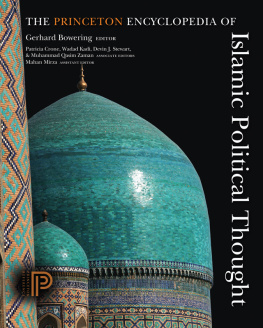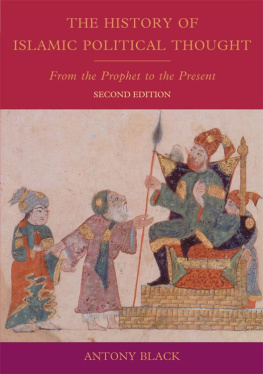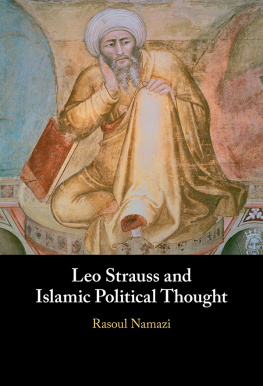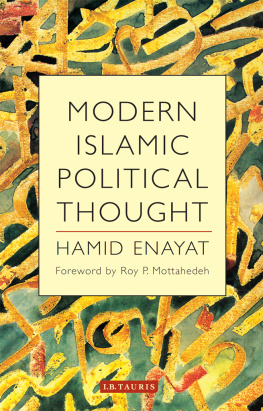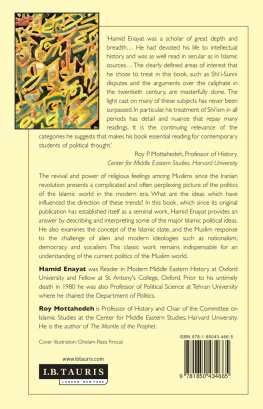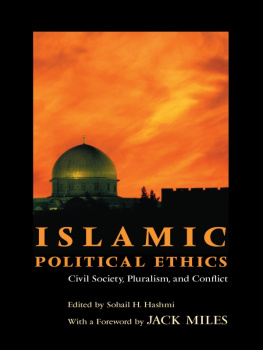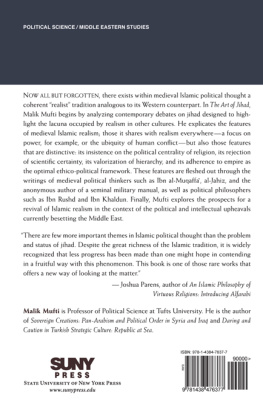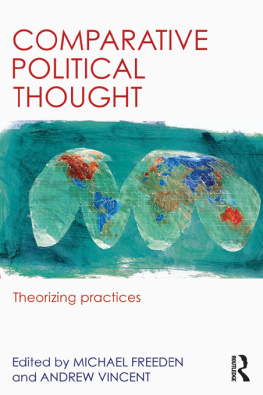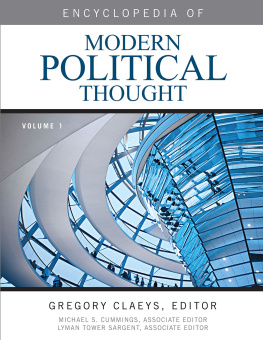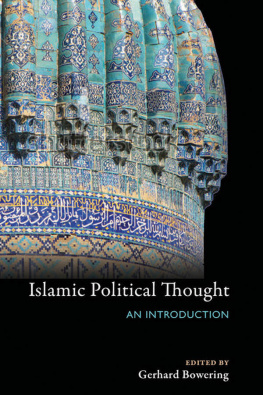Gerhard Bowering - The Princeton Encyclopedia of Islamic Political Thought
Here you can read online Gerhard Bowering - The Princeton Encyclopedia of Islamic Political Thought full text of the book (entire story) in english for free. Download pdf and epub, get meaning, cover and reviews about this ebook. year: 2012, publisher: Princeton University Press, genre: Politics. Description of the work, (preface) as well as reviews are available. Best literature library LitArk.com created for fans of good reading and offers a wide selection of genres:
Romance novel
Science fiction
Adventure
Detective
Science
History
Home and family
Prose
Art
Politics
Computer
Non-fiction
Religion
Business
Children
Humor
Choose a favorite category and find really read worthwhile books. Enjoy immersion in the world of imagination, feel the emotions of the characters or learn something new for yourself, make an fascinating discovery.
- Book:The Princeton Encyclopedia of Islamic Political Thought
- Author:
- Publisher:Princeton University Press
- Genre:
- Year:2012
- Rating:3 / 5
- Favourites:Add to favourites
- Your mark:
- 60
- 1
- 2
- 3
- 4
- 5
The Princeton Encyclopedia of Islamic Political Thought: summary, description and annotation
We offer to read an annotation, description, summary or preface (depends on what the author of the book "The Princeton Encyclopedia of Islamic Political Thought" wrote himself). If you haven't found the necessary information about the book — write in the comments, we will try to find it.
The Princeton Encyclopedia of Islamic Political Thought — read online for free the complete book (whole text) full work
Below is the text of the book, divided by pages. System saving the place of the last page read, allows you to conveniently read the book "The Princeton Encyclopedia of Islamic Political Thought" online for free, without having to search again every time where you left off. Put a bookmark, and you can go to the page where you finished reading at any time.
Font size:
Interval:
Bookmark:
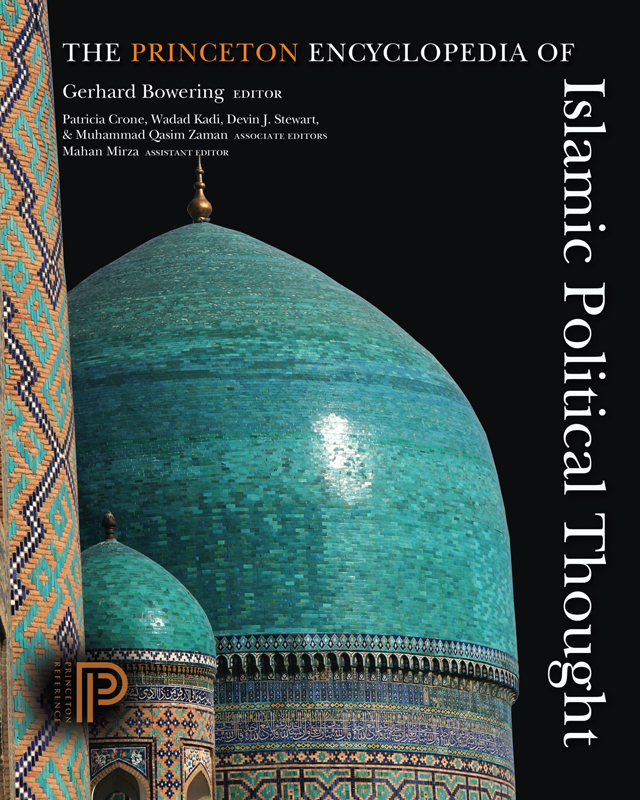
The Princeton Encyclopedia of Islamic Political Thought
The Princeton Encyclopedia of Islamic Political Thought
Editor
Gerhard Bowering
Yale University
Associate Editors
Patricia Crone
Institute for Advanced Study
Wadad Kadi
University of Chicago
Devin J. Stewart
Emory University
Muhammad Qasim Zaman
Princeton University
Assistant Editor
Mahan Mirza
Zaytuna College
PRINCETON UNIVERSITY PRESS
PRINCETON AND OXFORD
Copyright 2013 by Princeton University Press
Published by Princeton University Press, 41 William Street, Princeton, New Jersey 08540
In the United Kingdom: Princeton University Press, 6 Oxford Street, Woodstock, Oxfordshire OX20 1TW
Library of Congress Cataloging-in-Publication Data
The Princeton encyclopedia of Islamic political thought / editor, Gerhard Bwering ; associate editors, Patricia Crone... [et al.] ; assistant editor, Mahan Mirza.
p. cm.
Includes bibliographical references and index.
ISBN 978-0-691-13484-0 (hardcover : alk. paper) 1. Political scienceIslamic countriesEncyclopedias. 2. Political scienceIslamic EmpireEncyclopedias. 3. Islam and politicsEncyclopedias. I. Bwering, Gerhard, 1939 II. Crone, Patricia, 1945 III. Mirza, Mahan. IV. Title: Encyclopedia of Islamic political thought.
JC49.P75 2012
320.55'703dc23
2012003118
press.princeton.edu
Contents
The Islamic World Today in Historical Perspective
In 2012, the year 1433 of the Muslim calendar, the Islamic population throughout the world was estimated at approximately a billion and a half, representing about one-fifth of humanity. In geographical terms, Islam occupies the center of the world, stretching like a big belt across the globe from east to west. From Morocco to Mindanao, it encompasses countries of both the consumer North and the disadvantaged South. It sits at the crossroads of America, Europe, and Russia on one side and Africa, India, and China on the other. Historically, Islam is also at a crossroads, destined to play a world role in politics and to become the most prominent world religion during the 21st century. Islam is thus not contained in any national culture; it is a universal force.
The cultural reach of Islam may be divided into five geographical blocks: West and East Africa, the Arab world (including North Africa), the Turco-Iranian lands (including Central Asia, northwestern China, the Caucasus, the Balkans, and parts of Russia and the Ukraine), South Asia (including Pakistan, Bangladesh, and many regions in India), and Southeast Asia (the Indonesian archipelago; the Malaysian peninsula; Singapore; and minorities in Thailand, the Philippines, and by extension, Australia). Particularly in the past century, Islam has created the core of a sixth block: small but vigorous communities living on both sides of the Atlantic, in Europe (especially in France, Germany, Great Britain, the Netherlands, and Spain), and the Americas (especially in Canada, the United States, the Caribbean, and Argentina).
Islam has grown consistently throughout history, expanding into new neighboring territories without ever retreating (except on the margins, as in Sicily and Spain, where it was expelled by force, and the Balkans, where it is now regaining its foothold). It began in the seventh century as a small community in Mecca and Medina in the Arabian Peninsula led by its messenger, the Prophet Muhammad (d. 632), who was eventually to unite all the Arab tribes under the banner of Islam. Within the first two centuries of its existence, it came into global prominence through its conquests of the Middle East, North Africa, the Iberian Peninsula, the Iranian lands, Central Asia, and the Indus valley. In the process and aftermath of these conquests, Islam inherited the legacy of the ancient Egyptian and Mesopotamian civilizations, embraced and transformed the heritage of Hellenistic philosophy and science, assimilated the subtleties of Persian statecraft, incorporated the reasoning of Jewish law and the methods of Christian theology, absorbed cultural patterns of Zoroastrian dualism and Manichean speculation, and acquired wisdom from Mahayana Buddhism and Indian philosophy and science. Its great cosmopolitan centersBaghdad, Cairo, Crdoba, Damascus, and Samarqandbecame the furnace in which the energy of these cultural traditions was converted into a new religion and polity. These major cities, as well as provincial capitals of the newly founded Islamic empire, such as Basra, Kufa, Aleppo, Qayrawan, Fez, Rayy (Tehran), Nishapur, and Sana, merged the legacy of the Arab tribal tradition with newly incorporated cultural trends. By religious conversion, whether fervent, formal, or forced, Islam integrated Christians of Greek, Syriac, Coptic, and Latin rites and included large numbers of Jews, Zoroastrians, Gnostics, and Manicheans. By ethnic assimilation, it absorbed a great variety of nations, whether through compacts, clientage and marriage, persuasion, and threat or through religious indifference, social climbing, and the self-interest of newly conquered peoples. It embraced Aramaic-, Persian-, and Berber-speaking peoples; accommodated the disruptive incursions of Turks and the devastating invasion of Mongols into its territories; and sent its emissaries, traders, immigrants, and colonists to the lands beyond the Indus valley, the semiarid plains south of the Sahara, and the distant shores of the Southeast Asian islands.
By transforming the world during the ascendancy of the Abbasid Empire (7501258), Islam created a splendid cosmopolitan civilization built on the Arabic language; the message of its scripture, tradition, and law (Quran, hadith, and sharia); and the wisdom and science of the cultures newly incorporated during its expansion over three continents. The practice of philosophy, medicine, and the sciences within the Islamic empire was at a level of sophistication unmatched by any other civilization; it secured pride of place in such diverse fields as architecture, philosophy, maritime navigation, and trade and commerce by land and sea and saw the founding of the worlds first universities. Recuperating from two centuries of relative political decentralization, it coalesced around the year 1500 into three great empires: the Ottomans in the west with Istanbul as their center, the Safavids in Iran with Isfahan as their hub, and the Mughals in the Indian subcontinent with Agra and Delhi as their axis.
As the Islamic world witnessed the emergence of these three empires, European powers began to expand their influence over the world during the age of global discoverieswestward across the Atlantic into the Americas and eastward by charting a navigational route around Africa into the Indian Oceanthere entering into fierce competition with regional powers along the long-established network of trade routes between China on the one hand and the Mediterranean and East Africa on the other. The European exploration of the East and growing ability to exploit an existing vast trade network, together with the inadvertent but eventually lucrative discovery of the New World, were to result in Europes economic and political hegemony over the Islamic world, with which it had rubbed military and mercantile shoulders since the early Muslim conquests. The early modern Islamic world (and much of the rest of the world) fell behind the West economically and politically with the advent of the Enlightenment in the 18th century and the Industrial Revolution in the 19th century.
By about 1800, small European nations (e.g., England, France, and Holland) had established rule over large regions of the Islamic world. Their trading companies and imperial outposts in distant Muslim lands were transformed into colonies of European supremacy that were eager to benefit from Western industrialization. It took until the end of World War II for the global geopolitical map to become reorganized into an array of discrete nation-states on the European model. Muslim nations perceived Islam not only as the way of life led by the majority of the population but also as the source of normative principles for social order.
Next pageFont size:
Interval:
Bookmark:
Similar books «The Princeton Encyclopedia of Islamic Political Thought»
Look at similar books to The Princeton Encyclopedia of Islamic Political Thought. We have selected literature similar in name and meaning in the hope of providing readers with more options to find new, interesting, not yet read works.
Discussion, reviews of the book The Princeton Encyclopedia of Islamic Political Thought and just readers' own opinions. Leave your comments, write what you think about the work, its meaning or the main characters. Specify what exactly you liked and what you didn't like, and why you think so.

